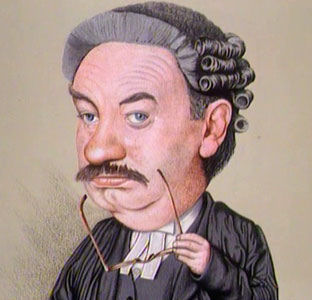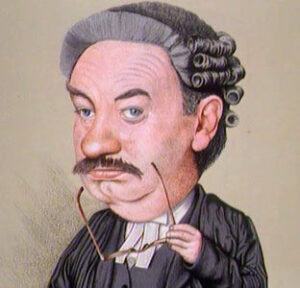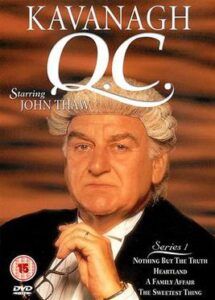Rumpole of the Bailey: The Iconic Legal Hero and His Legacy

I got this from Wikipedia, I think it was from the titles to Rumpole on TV
Few characters have captured the essence of the British legal system quite like Rumpole of the Bailey. Known for his sharp wit, love of claret, and constant battle against authority, Horace Rumpole is a larger-than-life figure who remains one of the most beloved characters in British literature and television. But what is it about this cantankerous, yet endearing, barrister that continues to captivate audiences? Let’s delve into the world of Rumpole, the man who created him, the television adaptation, and the influence he has had on the portrayal of the British legal system.
The Man Behind the Character: John Mortimer
Rumpole of the Bailey was the creation of Sir John Mortimer, a British barrister, author, and playwright. Born in London in 1923, Mortimer had first-hand knowledge of the law, having practised as a barrister for many years. His father, Clifford Mortimer, was also a barrister, and his relationship with his father provided inspiration for some of the more humorous aspects of Mortimer’s writing. John Mortimer initially wanted to pursue a career in writing but was encouraged by his father to enter the legal profession, a decision that ultimately gave him the material to create one of the most famous fictional barristers in British history.
Mortimer’s legal background was essential in the creation of Rumpole. His understanding of the court system, combined with his sharp sense of humour, allowed him to create stories that were both entertaining and insightful. Mortimer had a talent for blending satire with legal drama, and this combination brought Rumpole to life in a way that resonated with audiences. He understood the often absurd aspects of the legal system, and through Rumpole, he was able to critique it in a light-hearted but impactful way.
Rumpole on the Page: The Literary Origins
Rumpole first appeared in the short story “Rumpole of the Bailey,” published in 1978 as part of a collection. The character immediately captured the imagination of readers. Mortimer’s portrayal of Rumpole as a defender of the underdog—fighting against the pompousness of judges, prosecutors, and even his own colleagues—made him a relatable and admirable figure. In a world often dominated by prestige and power, Rumpole’s unwavering commitment to justice for his clients, regardless of their social standing, struck a chord with readers.

Rumpole’s most famous catchphrase, “Never plead guilty,” became synonymous with his character. His refusal to admit defeat, even in the most seemingly hopeless cases, highlighted his belief in the rights of the accused and the importance of a fair trial. Mortimer imbued Rumpole with an idealism that often stood in contrast to the cynicism of the world around him. Yet, at the same time, Rumpole was not immune to the flaws of humanity; his love for cheap wine and his complicated marriage to his wife, Hilda (affectionately known as “She Who Must Be Obeyed”), added depth and relatability to his character.
The TV Adaptation: Bringing Rumpole of the Bailey to Life
While Rumpole found success on the page, it was the television adaptation that truly brought him into the hearts of the British public. The series, which aired from 1978 to 1992 on ITV, starred the inimitable Leo McKern as Rumpole. McKern’s portrayal of the rumpled, curmudgeonly barrister was pitch-perfect, capturing both the humour and pathos of the character.
The television series followed Rumpole’s cases at the Old Bailey, often showcasing his battles against self-important judges and ambitious barristers, as well as his struggles at home with Hilda. The series retained the wit and charm of Mortimer’s writing, and McKern’s performance added a layer of warmth and humanity to Rumpole that endeared him to audiences. His iconic delivery of lines, particularly the oft-quoted “Never plead guilty,” became a defining feature of the character.
Leo McKern: A Perfect Fit for Rumpole
Leo McKern was an Australian-born actor with a long and distinguished career in film, television, and theatre. Born in Sydney in 1920, McKern began his acting career in Australia before moving to Britain, where he became a familiar face on the stage and screen. Before taking on the role of Rumpole, McKern was already well known for his roles in films like The Blue Lagoon (1980) and A Man for All Seasons (1966).
McKern’s portrayal of Rumpole was informed by his own life experiences, as well as his understanding of the character’s depth. He was able to capture Rumpole’s contradictions: his gruff exterior and his deep sense of morality, his cynicism tempered by an unwavering commitment to justice. McKern’s performance was so definitive that it’s difficult to imagine anyone else in the role. His ability to embody Rumpole’s complexities made him an indelible part of British television history.
The Inspiration for Rumpole
John Mortimer drew inspiration for Rumpole from several sources, including his own career as a barrister. Rumpole’s disdain for authority and his tendency to take on cases that others would dismiss as hopeless reflected Mortimer’s own experiences defending clients in court. In fact, Mortimer once stated that Rumpole was a version of himself, albeit a slightly more exaggerated one.
There are also elements of classic British characters in Rumpole’s makeup. Some have compared him to Charles Dickens’ Mr Pickwick or even Sherlock Holmes in his methodical approach to unravelling the truth. Like Holmes, Rumpole has an unshakable belief in justice, but where Holmes is cold and logical, Rumpole is driven by a passionate belief in the rights of the individual.
The Influence of Rumpole
Rumpole’s influence extends beyond literature and television. He helped to shape the way the British legal system is portrayed in popular culture, inspiring future legal dramas and comedies. Characters like Kavanagh QC and Judge John Deed owe a debt to Rumpole, as does the general tone of legal dramas that seek to balance the seriousness of the law with humour and humanity.

Moreover, Rumpole resonated with real-life barristers and judges. Many legal professionals admired Mortimer’s portrayal of the courtroom and his understanding of the subtleties of the legal system. Some even credited Rumpole with inspiring them to pursue careers in law. Mortimer’s ability to highlight both the absurdities and the nobility of the legal profession made Rumpole a hero not just to the public, but to those who practice the law.
Rumpole’s Enduring Legacy
Over four decades after his creation, Rumpole of the Bailey remains an iconic figure in British culture. John Mortimer’s creation, brought to life by Leo McKern, represents a unique blend of humour, justice, and humanity that continues to resonate with audiences. Whether in print or on screen, Rumpole’s legacy as a defender of the downtrodden, a critic of authority, and a champion of justice remains as strong as ever.
As legal dramas continue to evolve, the influence of Rumpole can still be seen in characters who fight for the underdog and refuse to bend to the whims of authority. Horace Rumpole may be retired from the courtroom, but his impact on the portrayal of the law in popular culture is unlikely to fade anytime soon.
Other Similar Characters in Books and on Screen

Characters similar to Rumpole of the Bailey often share traits such as a strong sense of justice, wit, and a somewhat rebellious attitude toward authority. Whether they work within the legal system like Kavanagh QC and Perry Mason, or tackle cases with intellectual rigor like Sherlock Holmes, these characters bring the same blend of intelligence, charm, and a bit of irreverence that makes Rumpole such an enduring figure.
Here are some examples you might enjoy.
1. Kavanagh QC (James Kavanagh)
- From: Kavanagh QC (TV series)
- Played by: John Thaw
- Similarities: Kavanagh QC, like Rumpole, is a barrister with strong principles, a deep sense of justice, and a quiet defiance of the legal establishment. He often takes on complex cases and has an understated charm, representing clients from all walks of life.
- Differences: Kavanagh is more serious and less sardonic than Rumpole, and his cases tend to delve into more solemn topics, but they share the common theme of standing up for justice.
2. Atticus Finch
- From: To Kill a Mockingbird (Novel and Film)
- Played by: Gregory Peck (Film adaptation)
- Similarities: Like Rumpole, Atticus Finch defends the underdog and stands for what’s right, even in the face of societal opposition. Both are calm and measured in their approach to justice, and they maintain a strong moral compass despite external pressures.
- Differences: Atticus is more of a moral hero and doesn’t possess the same degree of cynicism or acerbic humour that characterises Rumpole.
3. Perry Mason
- From: Perry Mason (TV series, novels by Erle Stanley Gardner)
- Played by: Raymond Burr (Original series)
- Similarities: Both Perry Mason and Rumpole are known for defending clients in seemingly hopeless cases. Perry Mason’s courtroom strategies, clever cross-examinations, and knack for uncovering the truth mirror Rumpole’s legal prowess.
- Differences: Perry Mason is more polished and serious, whereas Rumpole is far more irreverent and embraces a slightly shabby, rumpled appearance.
4. Judge John Deed
- From: Judge John Deed (TV series)
- Played by: Martin Shaw
- Similarities: Judge John Deed, like Rumpole, has a healthy disdain for authority and bureaucracy, often fighting against the establishment in pursuit of justice. He’s not afraid to challenge the legal system and call out its flaws, much like Rumpole does in the courtroom.
- Differences: John Deed is a judge, rather than a barrister, so he holds a different position in the legal hierarchy. He’s more of a rebellious figure, willing to cross lines that Rumpole, despite his critiques, would never cross.

Judge John Deed, a TV series showing another side to the legal stereotype
5. Sherlock Holmes
- From: Sherlock Holmes (Books by Arthur Conan Doyle)
- Played by: Multiple actors, including Benedict Cumberbatch and Jeremy Brett
- Similarities: Both Rumpole and Sherlock Holmes are brilliant at uncovering the truth and unravelling mysteries, often using logic, quick wit, and a methodical approach. Both characters are eccentric and have little patience for authority figures who get in the way of justice.
- Differences: Sherlock Holmes is far more analytical and aloof than Rumpole, who is emotionally engaged with his cases and clients. Holmes’s domain is criminal investigation, while Rumpole is firmly within the legal arena.
6. Jake Brigance
- From: A Time to Kill and Sycamore Row (Novels by John Grisham)
- Played by: Matthew McConaughey (Film adaptation of A Time to Kill)
- Similarities: Brigance, like Rumpole, often finds himself defending clients in morally complicated cases. He’s a small-town lawyer who takes on the establishment and fights for justice, sometimes at great personal risk.
- Differences: Jake Brigance’s Southern American context is very different from Rumpole’s London-centric world. Brigance is also portrayed as younger and more idealistic, while Rumpole has a jaded but humorous perspective on life.
7. Alan Shore
- From: The Practice and Boston Legal (TV series)
- Played by: James Spader
- Similarities: Alan Shore shares Rumpole’s biting wit, flair for the dramatic in court, and tendency to defy authority. He often tackles cases no one else would take, driven by a belief in justice, though he has a more modern and morally grey approach than Rumpole.
- Differences: Shore is more ethically ambiguous than Rumpole, who tends to operate on the principle of never pleading guilty. Shore sometimes uses underhanded methods, whereas Rumpole is more principled, even if cheeky.
8. Horace Rumpole (Other Legal Figures in Satirical Works)
- Characters in legal comedies or satires such as:
- Ally McBeal (From Ally McBeal): Quirky and eccentric, much like Rumpole, though in a more surreal, modern setting.
- Lionel Hutz (From The Simpsons): A comical and grossly incompetent lawyer, Lionel Hutz is an exaggerated parody of legal figures, though with a sense of humour that resonates with Rumpole’s lighter moments.
9. Philo Vance
- From: Philo Vance Mysteries (Books by S. S. Van Dine)
- Played by: William Powell (Film adaptation)
- Similarities: Like Rumpole, Vance is quick-witted and brings intellectual flair to solving cases. His charm, coupled with his legal background, makes him a distant cousin of Rumpole in spirit, though Vance is far more aristocratic.
- Differences: Vance is more refined and posh compared to Rumpole’s down-to-earth, everyman appeal.
10. Sir Humphrey Appleby
- From: Yes, Minister (TV series)
- Played by: Nigel Hawthorne
- Similarities: Although not a barrister, Sir Humphrey Appleby shares Rumpole’s ability to manipulate language and situations to his advantage, often with a dry wit. His disdain for authority and bureaucratic absurdities mirrors Rumpole’s perspective on the legal world.
- Differences: Sir Humphrey is a civil servant and operates within government circles, whereas Rumpole is strictly legal. Sir Humphrey’s motivations are more self-serving, while Rumpole is guided by his moral compass.
There is quite a list. When you look at some of them there is little comparison to Rumpole on the surface. Dig a bit deeper, take into consideration the churning logic then it becomes a little clearer. Of course Rumpole is very English (despite Leo McKern being otherwise) so some of the humour might be overlooked. Fortunately, the Americans have their own brand names of legal laughs to fill in the gaps.
Bertrand Russell once said, “The time you enjoy wasting is not wasted time.” That is the way I feel about hours watching Rumpole of the Bailey.
Cheers John
We have great way for you to sift the evidence the way your favourite characters do. In both long and short form, you choose, we have created a world where you become Rumpole or Sherlock. Coming soon.